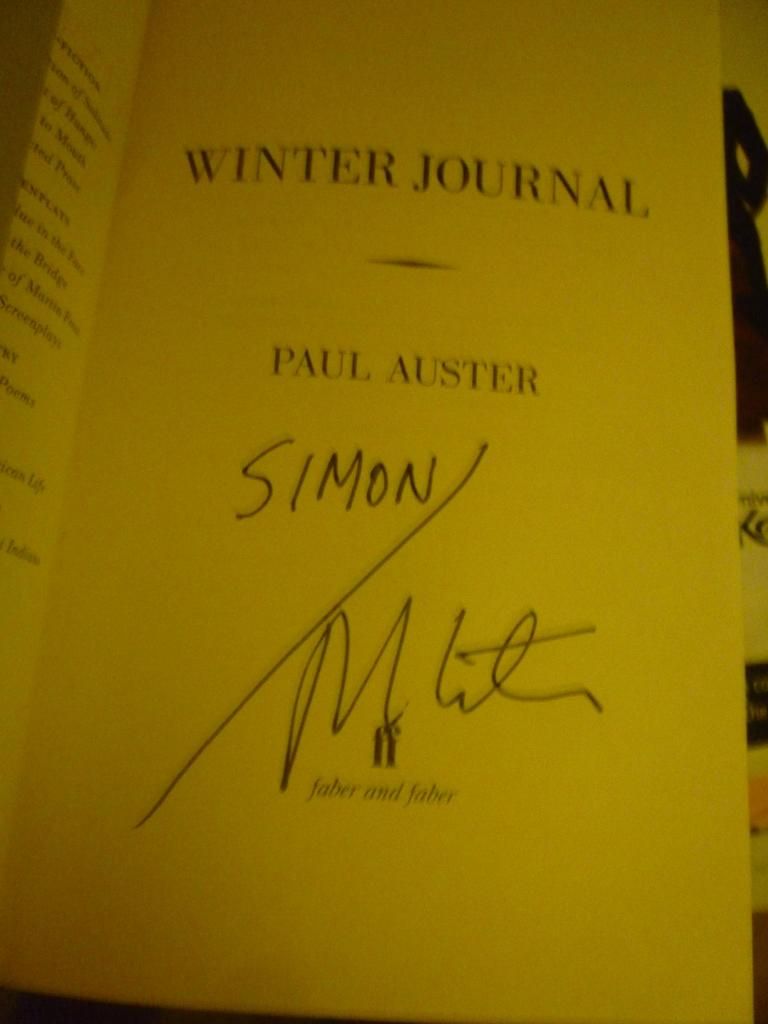Crash, I would say, is the most important novel I read in my formative teen years. As will be revealed later on, it momentarily messed me up in many ways, but its exciting melange of pornography, social commentary and clinical prose truly adrenalised me.
Ballard has previously stated that his novels like Crash involve protagonists self-creating their own "psychoses." In a fictional context this is a marvellous idea but, when transmuted into real life, from my own experience, it is harrowing.
In the midst of an episode I experienced, I was in the middle of writing some kooky thing when, suddenly, my hand began moving of its own volition. I was convinced - please bear in mind that I was completely and utterly crazy - that Ballard had entered my head. My hand, without my control, began writing in a style approximating Ballard's own. It said something like "I was trying to show in Crash what young men like Simon find fault in conventional education and how they find excitement and interest in novels such as these" before I interrupted this movement and wrote more dribble of my own.
Now, I am certain that this was hallucinatory. I don't believe in alchemy, astrology or any occult mambo-jumbo which may suggest the opposite. Still, it has confirmed to me that Crash is a novel that does indeed excite and enthral young men fed up with conformity, banality and narrow-mindedness. In many ways, it is a text that proffers an exit from that kind of prison.
What is it about it that's so special? I'll boil it down to four things:
1) The writing style, which is clinical and forensic yet strangely lyrical and poetic.
2) The breakdown in communications, where everyone is cold toward one another. All emotion appears to be eviscerated. Sex also becomes a mere physical activity, with all amorous connotations dispensed with.
3) Its transgressive quality. The 'disgusting' and 'shocking' parts of the book become so frequent that they hardly seem surprising.
4) How the characters yield to their obsessions.
And why did these four things appeal to me, subjectively speaking? First of all, that kind of 'clinical' writing style is very helpful for teens who write in a flowery way. It teaches you to economise in many ways. There is still a beauty to it - when I read through much of Ballard's best writing I am agog by it. As a stylist, I think that Ballard is a master, however clunky he may appear at times. Whilst he may not produce many memorable lines, he can certainly produce hard-hitting, arresting ones.
Strangely enough, I found the lack of 'warmth' and 'emotion' in Ballard's universe quite stimulating. In many ways, I kind of wish that people communicated like that in real life. The characters do not engage in sexual intercourse to 'bond' or to feel 'closer.' Many sex scenes are described in an almost medical way. I also love the use of scientific and mathematical jargon to describe the physiognomy of people. Words such as 'geometry' are used to describe the physicality of characters whilst words such as 'algebra' and 'gradient' are used when the protagonist attempts to rationalise situations.
The novel obviously has a transgressive quality, which is always emphasised when people name-drop it. This obviously appeals to moody teens full of angst. When the furore about David Cronenberg's 1996 adaptation erupted, many people objected to it on moral grounds. There does seem to be a moral detachment from the characters and they never disapprove (why would they?) of the sado-masochistic behaviour. This still hides the fact that Ballard clearly wrote this with an intellectual - and, yes, moral - agenda. The subtext of the book chiefly deals the physical and cerebral relationship between man and technology. There is a moral agenda to the book because, as Ballard points out in the preface, in many ways it is a cautionary tale. The relationship between sex, celebrity (in the novel a character is obsessed with dying in a car crash with Elizabeth Taylor) and the motor-car does prefigure in many ways incidents like Princess Diana's death.
Obsession is a major theme in the novel, pretty much what it is centred around. It is the main running thread through nearly all of Ballard's novels. This is palpable in The Drowned World, where the protagonist heads southward to the blazing heat and to certain self-annihilation. What I find fascinating about Crash is that the characters pin-point their obsession, however warped it may be, and follow it through to its logical conclusion, however bad the consequences may be.
I can obviously tell now that the book has its shortcomings. The central gist may just seem like a jeu d'spirit which may not pan out on the page. Many people feel like it is unnecessarily protracted. Whatever its failings, this is a model text for a very specific kind of rebellious teenager.
Monday 14 January 2013
Thursday 3 January 2013
Literary photos
Joseph Conrad is buried in Canterbury of all places. I searched the cemetery online and, as it happens, it is literally right next to my university. So, armed with a camera, I located it and... here it is. A real master.
Subscribe to:
Posts (Atom)



